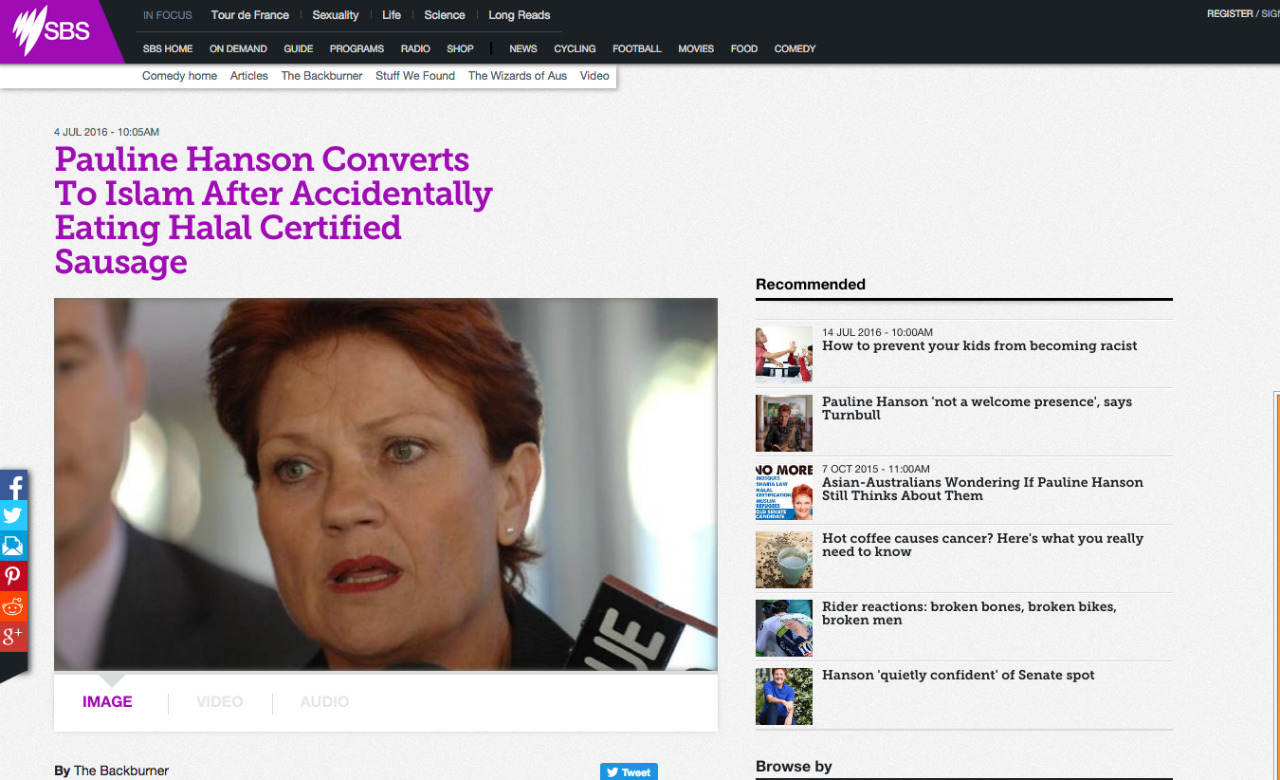Where News Meets Comedy: How Australian Journalists Are Using Satire to Deliver Bad News
Finding the funny bits with 'The Feed' host Jeanette Francis and 'The Weekly with Charlie Pickering' writer James Colley.
In partnership with
For the past few decades, the line between news and comedy has become increasingly ill-defined. From The Daily Show to Jon Oliver's Last Week Tonight, programs that offer a tongue-in-cheek look at current events have proven increasingly popular with young audiences across the globe. Here at home, similar escapades like Shaun Micallef's Mad as Hell, The Chaser, and The Weekly with Charlie Pickering work hard to cut through the noise of the 24-hour news cycle, packaging hard-to-digest news stories in funny, accessible ways that make viewers actually want to tune in.
The coalescence of real news and satire will be the subject of a panel at Storyology, Sydney's four-day journalism and storytelling festival presented by The Walkley Foundation. Among the speakers tapped for this particular panel, dubbed 'News Meets Comedy', are two poles of this new era: journalist Jeanette Francis, host of SBS TV's The Feed, and satirist James Colley, creator of The Backburner and a writer on The Weekly with Charlie Pickering. Ahead of the event, Concrete Playground spoke to both about the line between comedy and journalism, and how a blend of the two can help engage the public with news they might otherwise try to ignore.
![]()

The Feed.
IS IT FUNNY NEWS OR INFORMATIVE COMEDY?
One of the big questions faced by programs like The Feed or The Weekly is what comes first: the news or the comedy? "I think we're still debating amongst ourselves," admits Francis. "Are we a news program that's funny or a comedy program that's kind of newsy?"
Colley, for his part as a satirist (as opposed to a conventional journalist), sees The Weekly more as "a comedy program that uses news as its fodder," but also says that the aim should be to both entertain and inform. "If I can keep this funny, but also teach you something worthwhile, that's like the Golden Goose," he says. "You can't be spending your day watching and reading everything... and I don't blame people for not wanting to tune into the news. I don't want tune into the news a lot of the time, and I get paid to do it. But I think if what we can deliver is half an hour where you're laughing a lot and you're having a good time, and if we are so lucky as to also impart something worthwhile, then that's a dream position to be in."
For Francis, it boils down to a pretty simple formula. "One, it's got to be factual, and two it's got to be funny," she says. "As long as you've got the facts in there and as long as it's funny, I feel like you can kind of do whatever you want."
![]()

The Weekly with Charlie Pickering.
MAKE PEOPLE WANT TO PAY ATTENTION
Of course finding the humour in a serious news story isn't always easy. "One of the first big stories I got to work on in the first season was about Indigenous incarceration," says Colley. "Frankly, not a barrel of laughs. But it's a topic of deep importance, and one that means a lot for me."
"What you're trying to do is turn an eye towards something, and make it less scary," Colley continues. "I know I'm onto a good story if something is absolutely horrifying and I'm wondering, 'Why didn't I know about this?' And the answer is always because I didn't bother to engage with it. And if I didn't, chances are other people might not have either. So then it's your job to form that into something [people] would want to engage with."
This idea of making the news more engaging is something that appeals to Francis as well. "I think satire and comedy is a great way of communicating anything, and news is not an exception to that," she says. "For me, the journalist in the monochrome dress or suit standing in front of wherever it is talking into a microphone with that very journalistic voice that everybody has to learn, I think it's a style of journalism that is becoming a little bit more transparent... I think when there's comedy and there's satire, it goes a little bit past the headline and past just lifting the information and the facts of what happened. And I think that appeals to people."
![]()

IT PAYS TO AVOID THE EASY JOKE
With the rise of figures like Donald Trump in the US, as well as the resurgence of Pauline Hanson here at home, you'd imagine that this is a pretty good time to be working in satirical news. "Pauline Hanson will say a lot of things, and a lot of them don't make any sense," says Francis. "Sometimes you don't really need to point the finger at her repeatedly to get the point across. She does a very good job herself. But it's always been the case that conservative politicians, or politicians with a bit of flair, have always made good fodder for satirists."
On the other hand, you don't always want to be grabbing at low-hanging fruit. "What I've come to understand in the last couple of years, is that as much as you would think that chaos and absurdity and the absolute worst of these people is good for satire, it's actually the opposite," says Colley. "When you're trying to be substantive, and do in-depth looks at things, it doesn't help for someone to be blatantly wrong and awful. A good example would be a couple of years ago when Abbott bit into that onion. It doesn't take a satirist to work out that hey, that's weird and funny. It doesn't help you because it's too easy... no one wants to dunk on a child's hoop.
"I like when people talk in substance, because I don't want to be a flag-bearer for a side," he adds. "I want to have a debate of ideas to improve our democracy. To put it as loftily as I can, when I realise what I'm writing is dick jokes."
See Jeannette Francis and James Colley speak at Storyology from August 10-13. Find the whole program here. To sweeten the deal, the first 20 Concrete Playground readers to book tickets score 20 percent off, thanks to our partners at the Walkleys. Book here.






